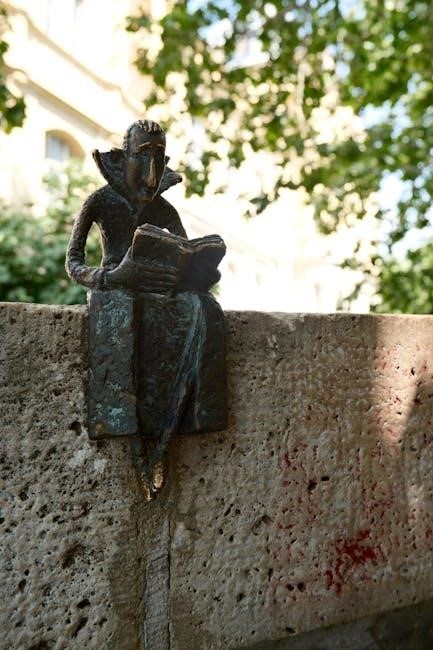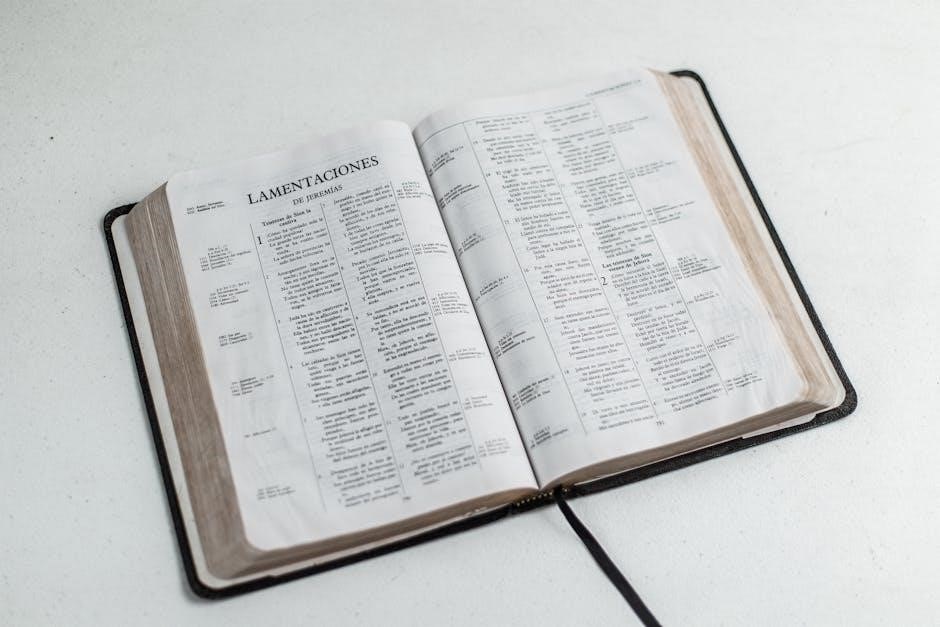Joseph’s story, found in Genesis 37-50, is a pivotal biblical narrative about faith, forgiveness, and God’s providence. As Jacob’s favored son, Joseph’s life unfolds through his prophetic dreams, his brothers’ jealousy, and his rise to power in Egypt, showcasing divine purpose amidst human turmoil.

Joseph in Canaan
Joseph, at 17, was tending the flock with his brothers in Canaan. As Jacob’s favored son, he received a special coat, symbolizing his father’s love. This favoritism, along with his prophetic dreams, stirred jealousy among his brothers, setting the stage for familial tension.
2.1 Early Life and Dreams
Joseph, the son of Jacob and Rachel, was 17 years old when his story begins. As the favored son, he received a special coat of many colors, symbolizing his father’s love. This favoritism, combined with Joseph’s youthful confidence, fueled tension with his brothers. Joseph’s early life in Canaan was marked by two prophetic dreams, which he shared with his family. In the first dream, he and his brothers were binding sheaves, and his sheaf stood upright while theirs bowed down. The second dream depicted the sun, moon, and stars bowing to him, symbolizing his future leadership. These dreams, though divinely inspired, angered his brothers and even troubled his father, who questioned their meaning. Despite this, Jacob’s concern for Joseph grew, setting the stage for the unfolding drama. Joseph’s early life and dreams laid the foundation for the larger narrative of divine purpose and human conflict.
The Brothers’ Jealousy and Betrayal
Joseph’s brothers, fueled by jealousy over his favored status and prophetic dreams, plotted against him. They stripped him of his coat, threw him into a pit, and sold him to merchants heading to Egypt for 20 shekels of silver, deceiving Jacob with a blood-stained coat.
3.1 The Plot and Sale into Slavery
Joseph’s brothers, driven by intense jealousy over his favored status and prophetic dreams, devised a sinister plot to eliminate him. They ambushed him, stripped off his iconic coat of many colors, and threw him into a deep pit. While Joseph languished in the pit, the brothers debated his fate. Judah suggested selling him to a passing caravan of merchants heading to Egypt, a decision they unanimously agreed upon. For 20 shekels of silver, Joseph was sold into slavery, marking the beginning of his arduous journey in a foreign land.
The brothers then deceived their father, Jacob, by dipping Joseph’s coat in the blood of a wild animal, falsely claiming he had been devoured by a beast. Jacob was consumed by grief, unaware of the betrayal orchestrated by his own sons. This act of treachery set the stage for Joseph’s eventual rise in Egypt, where God’s providence would transform his suffering into a divine purpose.
This pivotal moment in the story highlights the destructive power of jealousy and the beginning of Joseph’s extraordinary journey, where faith and forgiveness would ultimately triumph over betrayal.

Joseph in Egypt
Joseph, sold into slavery, arrived in Egypt and served Potiphar, an Egyptian captain, who trusted him as overseer of his household. Despite false accusations by Potiphar’s wife, Joseph remained faithful, even in prison, where his integrity and God’s favor shone brightly.
4.1 From Slave to Steward and Prison
Joseph’s journey in Egypt began as a slave, sold to Potiphar, an Egyptian captain, who recognized Joseph’s exceptional abilities and entrusted him with overseeing his household. Through his integrity and diligence, Joseph earned Potiphar’s trust, and the household prospered under his stewardship. However, Joseph’s success was soon disrupted when Potiphar’s wife falsely accused him of attempting to seduce her. Despite his innocence, Joseph was imprisoned for refusing to compromise his faith and morals.

In prison, Joseph continued to demonstrate unwavering faith in God. His ability to interpret dreams caught the attention of other prisoners, including Pharaoh’s cupbearer and baker. Though his circumstances were dire, Joseph’s trust in God’s providence remained unshaken. This period of trial laid the foundation for Joseph’s eventual rise to power, as his faith and integrity ultimately triumphed over adversity.

Joseph’s time as a slave, steward, and prisoner highlights his resilience and devotion to God, even in the face of unjust suffering. His story serves as a testament to the power of faith and the fulfillment of God’s plan, despite human wickedness and betrayal.

The Reunion with His Brothers
Years after being sold into slavery, Joseph’s brothers traveled to Egypt seeking food during a severe famine. Unaware of Joseph’s true identity, they bowed before him, fulfilling his childhood dreams. Joseph, now a powerful official, tested their integrity by accusing them of spying and imprisoning them for three days. He then released them, retaining Simeon as a hostage, and sent them back to Canaan with grain.
Upon their return, Joseph planted his silver cup in Benjamin’s sack, framing him for theft. When the brothers returned to Egypt, Joseph demanded Benjamin remain as his slave. Judah, showing repentance and responsibility, pleaded for Benjamin’s release, offering himself as a substitute. This demonstrated the brothers’ moral growth since their betrayal of Joseph years earlier.
Overcome with emotion, Joseph revealed his identity to his astonished brothers. He forgave them, explaining that God had orchestrated his journey to Egypt to save their family. The reunion was a poignant moment of healing and restoration, showcasing Joseph’s mercy and the fulfillment of God’s plan.
Forgiveness and Mercy
Joseph’s story reaches its emotional peak when he chooses to forgive his brothers for their betrayal. After revealing his identity, Joseph embraces them, saying, “Do not be distressed or reproach yourselves for selling me here, for God sent me ahead to save lives” (Genesis 45:5). This moment exemplifies his profound mercy and trust in God’s providence. Despite the pain they caused, Joseph frees his brothers from guilt, demonstrating unconditional forgiveness.
Joseph’s forgiveness was not conditional or partial; he showered his brothers with kindness, providing for their families and ensuring their well-being in Egypt. His actions highlight the theological theme of mercy triumphing over judgment. By forgiving his brothers, Joseph mirrored God’s grace, showing that hurt can be transformed into blessing when entrusted to divine purposes.
This act of forgiveness underscores the central message of Joseph’s story: trust in God’s sovereignty and the power of mercy to heal broken relationships. Joseph’s choice to forgive became a cornerstone of his legacy, teaching generations about the transformative power of love and grace.

Theological Themes and Lessons
Joseph’s story highlights God’s sovereignty, providence, and faithfulness. It teaches trust in divine plans, even amid suffering, and shows how God weaves human actions into His purposes. The narrative emphasizes forgiveness, mercy, and the transformative power of faith, offering timeless spiritual lessons.
7.1 God’s Providence and Faith
Joseph’s story is a profound demonstration of God’s providence and faith. Despite being betrayed by his brothers and sold into slavery, Joseph trusted in God’s plan, exemplifying unwavering faith. His rise from a slave to a trusted steward in Potiphar’s household, and later to a leader in Egypt, shows how God orchestrates even the darkest moments for good. The narrative underscores that God’s sovereignty is not limited by human actions, and His promises are fulfilled through unexpected means. Joseph’s faith in God’s providence sustained him through imprisonment and false accusations, ultimately leading to his exaltation. This theological theme emphasizes that believers can trust in God’s timing and purposes, even when circumstances seem insurmountable. Joseph’s life teaches that faith in God’s providence leads to restoration and blessings, not just for individuals but also for entire nations, as seen in the salvation of his family and Egypt during the famine. Through Joseph’s story, the Bible illustrates how faith and trust in God’s plan can transform suffering into a testament of His faithfulness and grace.